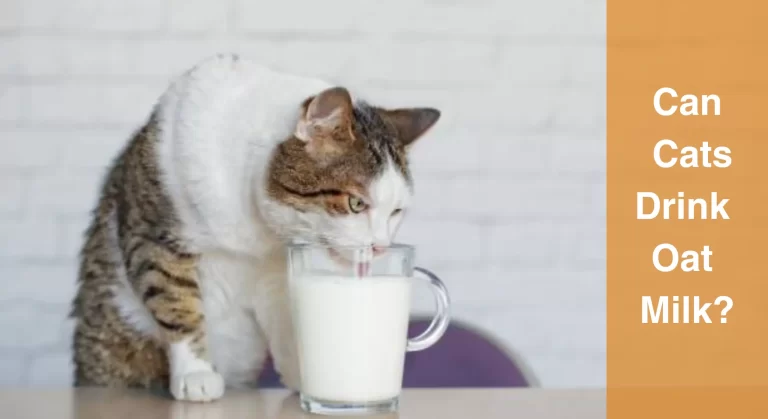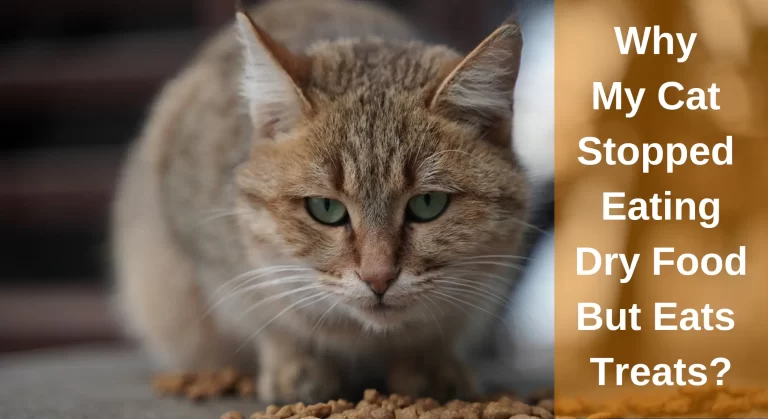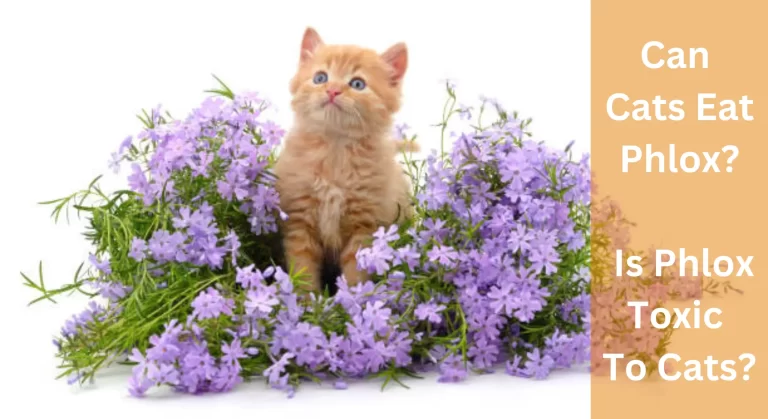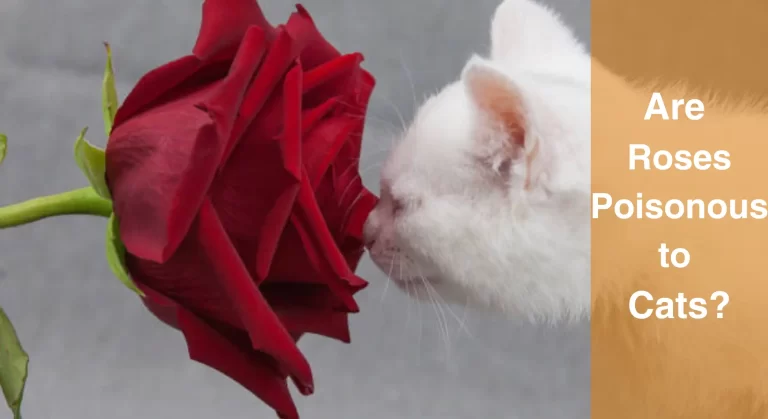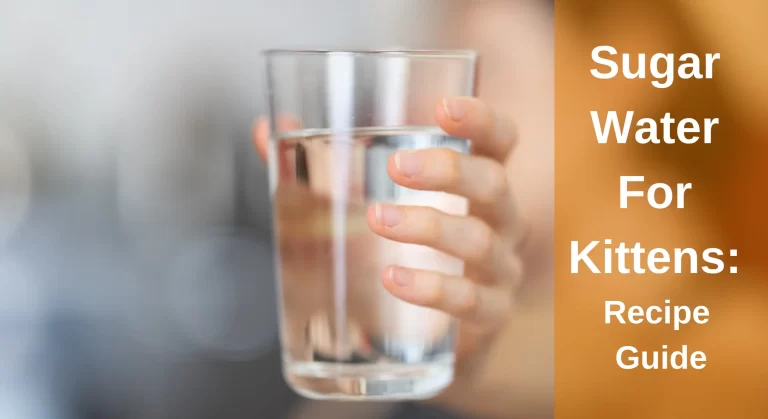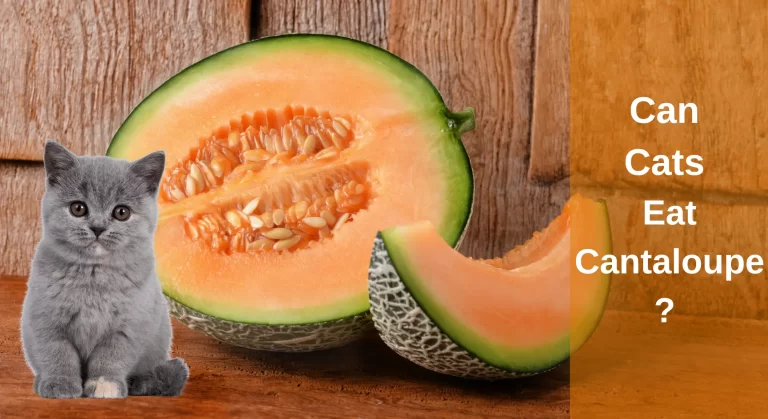Can Cats Eat Pear? Exploring the Benefits and Risks of Feeding Your Cat Pears
Fruit is a fantastic complement to a balanced diet since it gives us a lot of dietary fiber as well as a variety of other vital nutrients. Just the same, pears also contain a lot of fiber and are packed with nutrients that are good for your health and fitness. Now you might ask if providing pears to cats is beneficial for their health given that they are primarily carnivores. “Can Cats Eat Pear?”
Yes, cats can eat pears safely, but it doesn’t mean they should eat them regularly. Pears are not poisonous or harmful, and they include fiber, antioxidants, vitamins as well as copper and also don’t contain excess calories. But, pears contain extra sugar than other fruits which may cause problems for your cats. Also, its seedling and outer skin may contain trace amounts of cyanide that are harmful to cats.
It’s possible that you were planning to offer your cat this delectable fruit to celebrate its nutritional benefits with it, but doing so might be dangerous. However, there are a few important things to keep in mind. So, in this post, we’ll examine the advantages of giving your cat pears, whether they’re safe for cats or not, and guide you about feeding pears to cats.
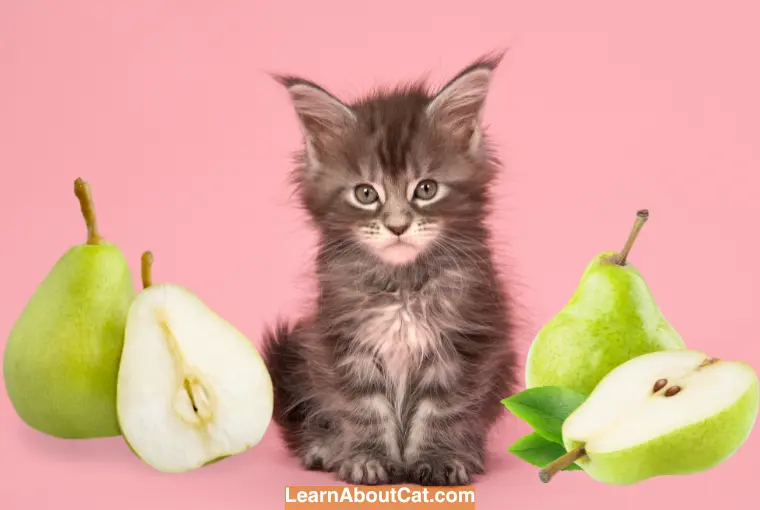
Can Cats Eat Pear?
Yes, cats can eat pears safely in moderation. In addition to healthy, cat-safe food, they’re a fantastic way to give your cat get some additional nutrition because they’re rich in vitamins C, A, and fiber.
However, pears are also high in sugar, so it’s important to feed them to your cat in small amounts and as an occasional treat. Since cats are carnivores, they must be given conventional cat food that is primarily composed of meat.
Furthermore, keep in mind that cats can only consume the flesh of this fruit. Before feeding pear to your cat make sure that you have removed the stems and skin of pears that contain toxic cyanide.
Check Out: Can Cats Eat Lychee?
Is Pear Safe for Cats to Eat?
Yes, pear is safe for cats to eat. They are usually an appealing delicacy to give your cat occasionally — and in balance. The fruit’s pulpy portion, which is wonderful for your cat, provides some healthy nutrients, minerals, and hydration.
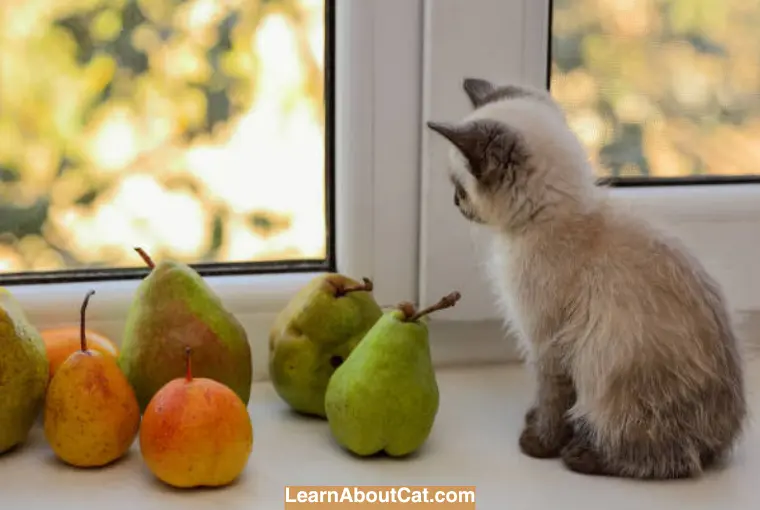
But, the seedlings’ stems and outer peel of the pear are dangerous. Pear seeds stems, and peel includes cyanogenic glycosides, which in high concentrations can be toxic or even lethal. Keep in mind the pear is clear of seeds when you plan on feeding it to your cat.
Recall that cats are carnivores so they don’t need this kind of foodstuff in their diet apart from the nourishment supplied by meat, which is quite enough for their fitness.
Also, Check Out: Can Cats Eat Honeydew?
Are Pears Good for Gats?
Yet, pears do include some nutrients that may be beneficial, such as vitamin C, vitamin A, and a lot of fiber.
When giving pears to your cat, there are a few risks to be cautious of in addition to the seeds, particularly the sugar level. Pears must be served fresh, uncooked, and in manageable portions.
Don’t feed your cat canned pears because they frequently include syrupy sugar water. Even uncooked pears contain a lot of sugar and ought to only be consumed in moderation.
Every animal needs fiber in their diet, and all fruits are rich in dietary fiber, which is generally good. However, feeding your cat fiber in excess may have a laxative effect and leads to diarrhea, which can further cause problems including dehydration.
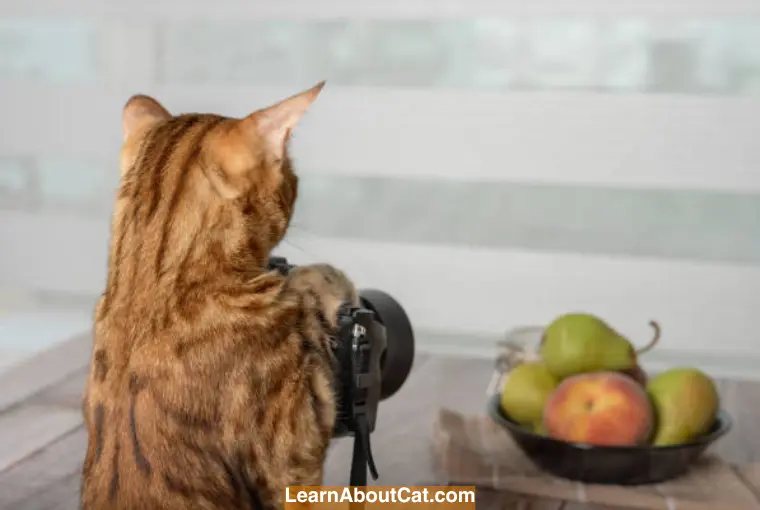
Nutritional Value of Pears
One small pear contains the following nutrients:
- 101 calories
- 0.2g fat content
- 17.2g sugar
- 0.6g proteins
- 5.5g fibers
Not only these essential nutrients it also includes:
- Vitamin C, K, B3 and A
- Potassium
- Folic acid
- Antioxidants
Find Out: Can Cats Eat Cantaloupe?
Health Benefits of Pears for Cats
Pear is a great food to include in a cat’s nutrition. This luscious fruit is very nutrient-dense. There are several benefits to dealing with your cat’s wellness with a ripped pear.
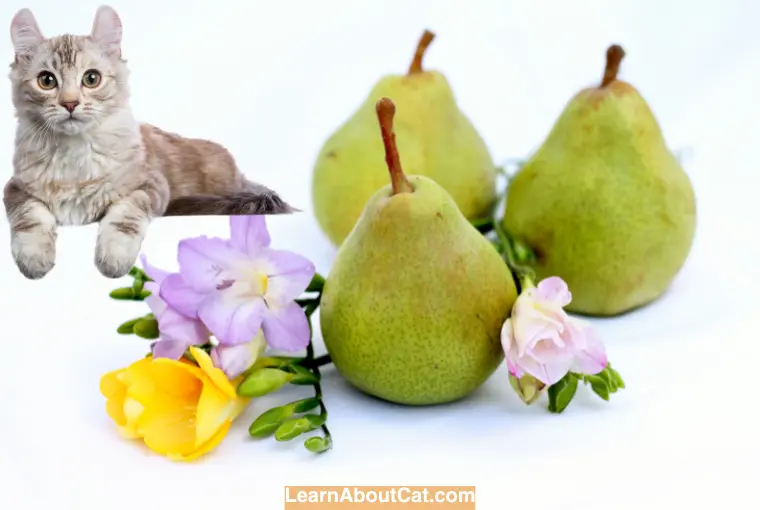
Nutritional Benefits
Nutrients such as vitamins C and A, potassium, protein, and copper are all present in pears. Pears have a lot of antioxidants, and the vitamin A they contain helps to improve cats’ vision and makes their immune systems strong.
Antioxidants and vitamin C stimulate the immune systems of cats to fight sickness by increasing the synthesis of immunity cells.
Makes Cats’ Digestive Systems Active
Pectin, a type of solvent fiber found in pears, helps maintain the equilibrium of germs in the gastrointestinal tract by sustaining bacteria. The fiber helps to maintain normal bowel movements and manages your cat’s constipation issue.
As you know, regular bowel motions are essential for the daily elimination of toxins. Pears’ water level aids in keeping faeces smooth and soft, making it a crucial regular task for cats to perform energetically all day.
Minimize cancer
Pears contain substances that fight the damage caused by free radicals and prevent cancer. Pears can protect your cat from several cancers, particularly colorectal and rectum cancer in felines. Pears contain a lot of fiber, which binds to malignant cells and eliminates them.
Improves immune functions
Pears have a substantial amount of vitamin C, as well as huge quantities of polyphenols, phytochemicals, and flavonols.
Pears contain strong antioxidants and phytonutrients, which can help cats fight sickness and boost their immune system. This fruit contains no salt, cholesterol, or lipids either.
Benefits the Breathing System
Pears can help cats with respiratory conditions brought on by the flu and cold symptoms. The sweet nectar and luscious flesh moisten the esophagus, thin down mucous, and guard against infections.
In addition, glutathione, which is an antioxidant, increases mucus production and lung resistance in cats.
Lowers Heart Risk
They can also decrease the likelihood of cardiovascular disease in cats whilst assisting in the improvement of their general health. Pears have a very high percentage of dietary fiber and pectin, which might help lower triglycerides effectively.
Pears’ antioxidants could also lower inflammation, improve the condition of vessels, and neutralize free radicals which can harm a cat’s heart and lungs.
Encourages Effective Weight Control
Pears can aid in weight loss in cats and encourage sensible weight management. Its benefit is primarily connected to the higher fiber content of pears.
Fiber might make cats feel full and satisfied and prevent overeating. They are calorie-free and full of vitamins and minerals.
Also Read: How to Help a Cat Lose Weight with Multiple Cats at Home?
Strengthens Bones
The wonderful nutritional composition of pears, which includes calcium and vitamin K, helps cats to promote their bone density.
The cat’s capacity to retain magnesium and calcium, these two key elements are crucial for maintaining body condition. Moreover, Boron also and Vitamin K also aid in bone growth and prevent feline bone problems.
Influence on Bacteria
Pears’ tannins and caffeic shield cats’ bodies from a variety of illnesses and illnesses. Due to their high phenolic contents, pears can kill and inhibit the growth of germs in cats.
Intresting Reading: Can Cats Eat Goji Berries?
A Guide to Feeding Pear to Cats
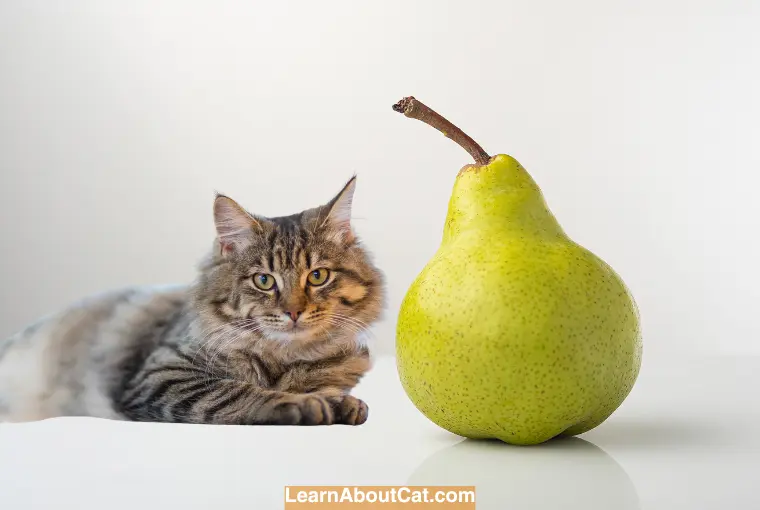
Prepare Pears
Before serving a pear to your feline, make sure to pay attention to how you prepared it. Avoid giving them a full pear.
If you want your cat to eat pears, you must slice them up into little pieces and remove the seeds. For pears with peel, the tiny size is crucial since thick skin might cause a choking risk.
You must rinse the pear once before ingesting it or feeding it to your feline. Fertilizers and chemical leftovers are frequently still present on the peel of the fruit.
These pesticides can be removed from the pear by giving it a lukewarm vinegar rinse and then a water wash.
Fresh, Tinned, or Dried Pears— Which Form Is Suitable?
If you’re going to give pear to your cat, then fresh pear is ideal. Pears in cans are frequently kept in syrups high in sugar, which cats should never consume.
Their metabolisms may be thrown off by the excessive sugar level, which can also cause dental decay. Because of its significant amount of sugar, dried fruit is also bad for cats. Dry fruit’s sticky texture might also become lodged in a cat’s jaws.
Mashed pears without any additional ingredients may be appropriate; if your cat enjoys pears, this could even be a nice method to encourage them to take their medication!
Moderation
Moderation is crucial when feeding pears to cats. Pears must be a little, infrequent delight and in no way a regular component of their nutrition. A carnivore’s meal does not need to include any veggies or fruits.
Although unprocessed “beneficial sugars,” fruits like pears include a large concentration of sugar, that’s not good for cats.
Pears have a lot of fiber, which when eaten too much can irritate the stomach and induce diarrhoea and exhaustion.
Frequently Asked Questions
Do cats like Pear?
Pears’ tangy flavor and juicy feel make them a favorite food of many cats. To avoid choking, offer your cat pears in small chunks.
Can cats eat Korean pears?
In moderation and as an appetizer, Korean pears are suitable for cats. The seedlings, peel, and stem should also be removed because they are harmful to your cat.
Can cats eat Asian pears?
There are small amounts of cyanide in Asian pear seeds. Even while it may be tempting to give your cat the leftover pear center, you must avoid giving seeds to him since they can choke on them and are harmful in large amounts.
Can cats eat canned pears?
Avoid giving cats canned pears since they contain sugar syrup, which they shouldn’t consume. It can cause weight gain and is harmful to the health of the teeth.
Can Cats Eat Prickly Pear?
Although prickly pears aren’t harmful to cats, eating them can nevertheless lead to major issues. These spikes have the potential to hurt your cat. Also, the glochids attached to them are dangerous.
Can cats eat dried pears?
No, cats can’t consume dried pear as it is loaded with sugar, which will make your four-legged buddy rush to the litter box. Although she has swift legs, they are not fast enough to handle the bowel moments caused by the sugar content in dried pears.
Are pears bad for cats? How much pear is too much for cats?
Pear fruit is safe for cats to consume in small amounts. However, remember that cats don’t require any diet except meat to survive.
Make sure you only give your cat only a few slices of the pear. Pears might include cyanide, E. coli, and other bacteria, as well as chemicals, thus feeding your cat pears in big quantities might be harmful to their health.
Can cats eat apples?
Yes, cats can occasionally consume a tiny slice of apple pulp, however, this fruit isn’t a must for their nutrition. Apples’ meat is not poisonous to cats, but their seedlings, stems, and leaves could be because they all include cyanide. However, your cat needs to consume an excessive amount of apple seeds to achieve a deadly quantity of cyanide, the seedlings can still irritate your cat’s tummy.
Final Verdict
When given in moderation, pears are a nutritious treat for your cat. They are a wonderfully nutritious snack occasionally since they have a lot of dietary fiber and certain essential nutrients and minerals. Keep in mind that pears are chopped into tiny, palatable pieces, fresh, devoid of seeds, and without any additional syrups.
The sugar in pears should be your biggest concern because it can have a serious negative impact on your cat’s well-being if given in excess. Overall, balance is crucial, and giving your cat the occasional tiny chunk shouldn’t hurt them and could be beneficial to their health.
Who is Isabella?
My name is Isabella, and I am a dedicated and knowledgeable cat enthusiast. With years of experience caring for cats and a deep love for felines, I made a mission to help other cat lovers navigate the challenges of cat ownership.

